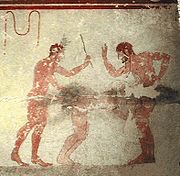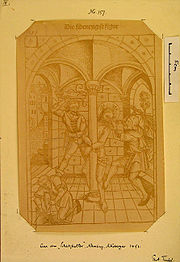- Flagellant
-
 Flagellation im sexuellen Kontext. Wandmalerei im Grab der Züchtigung in der Totenstadt von Tarquinia (Italien)
Flagellation im sexuellen Kontext. Wandmalerei im Grab der Züchtigung in der Totenstadt von Tarquinia (Italien)Das Auspeitschen, auch Flagellation oder Geißelung (von lat. flagellum: Geißel) mit verschiedenen Peitschen, Ruten oder einem Rohrstock kann zu verschiedenen Zwecken und aus unterschiedlichen Beweggründen erfolgen. Praktiziert wird bzw. wurde die Flagellation sowohl im Kontext der Religion, als Strafe in Erziehung und Justiz sowie als Spielart der Sexualität.
Inhaltsverzeichnis
Religion
Die mittelalterlich-christliche Laienbewegung der Flagellanten bzw. „Geißler“ praktizierte im 13. und 14. Jahrhundert Geißelübungen als selbstauferlegte Buße für Sünden und Laster. Die Geißelung Christi ist ein beliebtes Motiv der Passion Christi. So wird z. B. in der bayerischen Wieskirche der „gegeißelte Heiland“ verehrt. Auch bei den Schiitischen Passionsspielen wird die Geißelung („Sinazani“) beim Aschurafest praktiziert.
Erziehung und Justiz
Auspeitschen war in früheren Zeiten eine gebräuchliche Körperstrafe für verschiedenste Vergehen. In Klöstern, Schulen und anderen Einrichtungen wurde das Auspeitschen als Erziehungsmittel eingesetzt. In der Justiz auch einiger heutiger Länder wird Auspeitschen nach wie vor praktiziert (siehe auch Staupenschlag).
Sexualität
Auspeitschen wird auch als Sexualpraktik verwendet, um sexuelle Lust zu erzeugen. Die Vorliebe für sexuelle Flagellation wird Flagellantismus genannt und zählt zur sexuellen Spielart des BDSM bzw. des Sadomasochismus. Die Anhänger dieser Sexualpraktik bezeichnet man auch als „Flagellanten“, was jedoch zu Verwechslungen mit den religiösen Geißlern führen kann. Eine schwächere, weniger auf körperlichen Lustschmerz als auf sexuelle Dominanz und erotische Rollen- und Erziehungsspiele angelegte Form des Flagellantismus ist das sogenannte Spanking.
Weblinks
Wikimedia Foundation.

